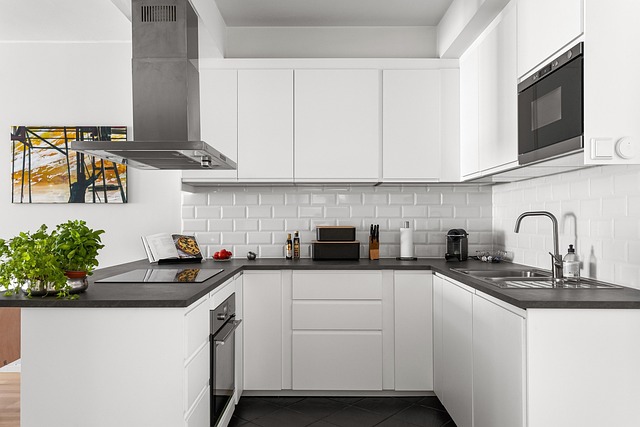Maintaining clean kitchen floors is crucial for food safety, customer experience, and overall space aesthetics in restaurants. Hiring local experts offers specialized care, tailored services, and community support. Different flooring types (tile, vinyl, wood, stone) require distinct cleaning methods. Using the right tools and eco-friendly products ensures effective sanitization. A professional process involves clearing debris, sweeping/vacuuming, mixing cleaning solutions, mopping, and rinsing. Consistent cleaning, deep scrubbing, and ventilation prevent issues and prolong floor lifespan. Regular spot cleaning with appropriate cleaners and mats maintains hygiene. Selecting local kitchen floor cleaning services specialized in food-safe, eco-friendly practices ensures top-notch results.
Looking for gleaming kitchen floors? Understanding the importance of clean kitchen floors is the first step. Dirty floors not only look unappealing but can also harbor bacteria and pose health risks. Hiring local kitchen floor cleaning experts offers numerous benefits, from deep cleaning to maintaining various floor surfaces. This comprehensive guide covers everything from choosing the right cleaning tools to tips for spotless floors between professional cleanings. Discover how local pros can revolutionize your kitchen’s cleanliness!
Understanding the Importance of Clean Kitchen Floors

Maintaining clean kitchen floors is more than just a matter of aesthetics; it’s a vital part of creating a safe, hygienic environment for food preparation and service. Kitchen floors are often the most trafficked areas in a home or commercial kitchen, making them prone to dirt, grease, and bacteria buildup. Regular kitchen floor cleaning not only prevents slip-and-fall accidents but also helps eliminate harmful pathogens that can cause foodborne illnesses.
A clean kitchen floor ensures that your space adheres to health and safety standards, which is particularly crucial for restaurants and catering establishments. Beyond practical considerations, a gleaming kitchen floor contributes to a pleasant ambiance, enhancing the overall customer experience in dining areas.
Benefits of Hiring Local Experts for Floor Cleaning

Hiring local kitchen floor cleaning experts comes with numerous advantages for several reasons. Firstly, they understand the unique challenges that come with deep cleaning kitchen floors, whether they’re made of tile, wood, or vinyl. Local professionals are likely to be familiar with the specific types of flooring in your area and will know exactly how to care for each material, ensuring no damage occurs during the cleaning process.
Additionally, engaging the services of local experts supports small businesses and fosters a strong community. These professionals often provide personalised service, taking the time to understand your needs and expectations. They can offer tailored solutions that go beyond standard cleaning, such as polishing, sealing, or repairing minor damages, enhancing the overall aesthetics and longevity of your kitchen floors.
Types of Kitchen Floor Surfaces and Their Unique Care Requirements

Kitchen floors come in various types, each with its own set of care requirements for effective kitchen floor cleaning. Tile and ceramic floors, popular choices for their durability and water resistance, require regular mopping to remove spills and dirt. Using the right detergent is key to avoiding streaks and keeping the surface gleaming. Vinyl flooring, another common option, benefits from periodic cleaning with a mild detergent and warm water. It’s important to avoid harsh chemicals that can damage its finish.
For wood floors, whether solid or engineered, a more delicate approach is needed. Sweep or vacuum regularly to prevent debris buildup, then use a damp mop with a neutral pH cleaner to avoid warping or discoloration. Stone floors, such as granite or marble, demand specialized care. They should be sealed and periodically cleaned with a pH-neutral stone cleaner to prevent etching and maintain their natural beauty.
The Right Tools and Products for Effective Deep Cleaning

When it comes to deep cleaning kitchen floors, the right tools and products make all the difference. Professional cleaners know that investing in high-quality equipment and eco-friendly solutions is key to achieving streak-free results and maintaining a healthy environment. Start with a powerful vacuum cleaner designed to handle heavy debris and dirt, followed by a deep cleaning solution specifically formulated for kitchen floors. These solutions often include enzymes that break down grease and grime, ensuring no residue is left behind.
Additionally, a good quality floor scrubber or mop is essential. Manual scrubbers allow for more control and are ideal for stubborn stains, while automatic mops can cover larger areas swiftly. Remember to choose products suitable for your floor type, whether it’s tile, vinyl, or wood, as different materials require unique care. Regular maintenance with the right tools will keep your kitchen floors looking fresh and clean.
Step-by-Step Guide to Professional Kitchen Floor Cleaning

Professional kitchen floor cleaning requires a systematic approach to ensure deep and thorough sanitization. Start by clearing all surfaces, removing any debris or loose items. Next, sweep or vacuum thoroughly to eliminate dust and dirt. This step is crucial for preparing the floor before application of any cleaning solutions.
Once the floor is swept, mix a suitable cleaning solution, ideally one designed specifically for kitchen floors, with warm water. Test the solution on a small, inconspicuous area first to check for any adverse reactions or staining. Apply the solution using a mop or sponge, working from one side of the room to the other in straight lines. Pay special attention to high-traffic areas and corners where dirt may accumulate. After cleaning, rinse thoroughly with clean water using a fresh mop or cloth, ensuring no residue is left behind.
Common Challenges in Kitchen Floor Maintenance and Solutions

Maintaining kitchen floors can be a challenging task due to the high traffic and constant exposure to water, grease, and dirt. Common issues include slippery surfaces from oil buildup, hard-to-remove stains, and the need for regular disinfection. To tackle these challenges, start by investing in high-quality floor materials that are durable and easy to clean. Regular mopping with a suitable cleaning solution is essential; look for products designed specifically for kitchen floors to prevent residue build-up.
For stubborn stains, consider using natural enzymes or specialized cleaning agents that break down grease and grime effectively. Implement a regular deep cleaning schedule, including scrubbing hard-to-reach areas and applying floor coatings or sealers to protect the surface and extend its lifespan. Additionally, ensuring proper ventilation during cleaning reduces moisture issues and prevents the growth of bacteria and mold, keeping your kitchen floors safe and hygienic.
Tips for Keeping Your Kitchen Floors Spotless Between Cleanings

Keeping your kitchen floors spotless between professional cleanings involves a combination of proactive measures and simple, everyday practices. Start by sweeping or vacuuming regularly to remove loose dirt and debris that can accumulate over time. This prevents grit from becoming embedded in your flooring, causing scratches and making future cleaning more difficult. Additionally, use floor mats at entryways to trap dirt and moisture before it reaches your floors.
Implementing a robust cleaning routine is key. Wipe up spills immediately with a clean cloth or paper towel. For tough stains, invest in mild, floor-specific cleaners designed to cut through grease and grime without damaging your kitchen’s surface. Remember, consistency is crucial; scheduled deep cleaning sessions will ensure any lingering issues are addressed promptly, maintaining the gleam and longevity of your floors.
Choosing the Best Local Kitchen Floor Cleaning Service

When it comes to choosing a local kitchen floor cleaning service, it’s essential to consider several factors for a spotless and durable clean. Look for professionals who specialize in kitchen floor cleaning, as they’ll have the necessary equipment and expertise to handle stains, grime, and tough odors that come with high-traffic areas like kitchens. Reputable companies will offer eco-friendly solutions, ensuring your floors are cleaned thoroughly without harming your family or the environment.
Check customer reviews and testimonials to gauge their reputation and service quality. Local businesses often have a stronger commitment to community satisfaction, so you might find better care and personalized attention from them compared to larger franchises. Ask for references, insurance information, and details on their cleaning processes beforehand to make an informed decision that keeps your kitchen floors sparkling and healthy.
